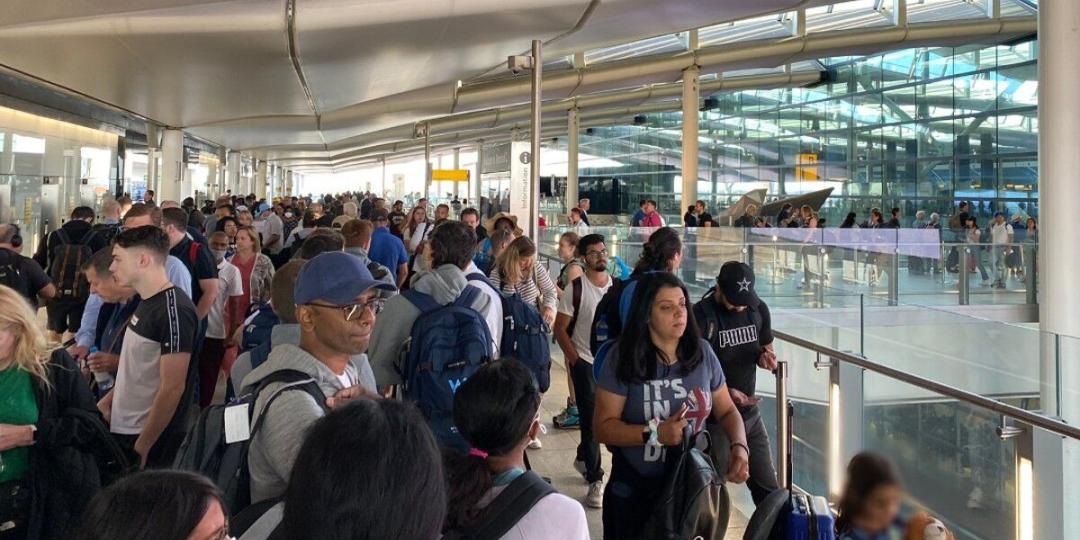It’s now common knowledge that the problems at UK airports – enormous queues, lost baggage, undelivered baggage, delayed flights and cancelled flights – have been due to a post-COVID surge in travel. European and British summer school holidays have converged with woeful delays at every part of the airport – ground handling, baggage handling, check-in and security.
It's this which has led to three months of unprecedented, ever-worsening chaos across European and UK airports. Heathrow, as the icon of efficient European airports, and one with very high numbers of scheduled flights, has come under some harsh criticism.
Now, the airport has cancelled more than 60 flights for Monday, July 18, and has given airlines warning of more to come. It is limiting departing capacity to 100 000 passengers per day until September 11 this year.
But this is an enormous cost to airlines, according to aviation data company, OAG.
For those airlines with Heathrow as their hub, the implications are more severe says OAG. “British Airways and Virgin Atlantic, are they expected to cut capacity by 20% each day through to the middle of September?”
Airlines will need to, in the middle of the high season, stop selling more seats on flights from Heathrow, ie, the higher-yielding last-minute sales. They will also have to cancel planned services and re-accommodate those passengers affected onto other alternate flights. But nobody knows onto which flights those pax will be reaccommodated, as almost all capacity has already been taken on every airline, and they too are capped.
OAG says: “Assuming a notional yield of US$400 (R6 800) per passenger departing from Heathrow in the peak summer (a conservative estimate) this equates to lost revenue of over US$ 550 million (R9,36 billion).”
The root of the problem is understaffing.
Airlines and airports asked staff to take deep pay cuts or had to lay them off, retrench, furlough or even dismiss them in numbers when the implications for travel because of the COVID pandemic became clear. BA alone shed 10 000 jobs. These workers do not necessarily wish to return now that they are needed. Some aren’t available to return to their old jobs, some have found other jobs and for some, the offer on the table is not attractive enough.
But restoring pay levels has been problematic. It has taken a planned strike by BA’s Heathrow check-in staff to convince BA for one, to restore these staff members’ pay packets to their pre-pandemic levels, according to British press.
Ground handlers at Gatwick Airport (not employed by the airport but by companies such as Menzies and Swissport), have secured themselves 10% pay rises.
Now easyJet is having to offer a retention bonus to crew in Spain to see out the summer to the end, such is the battle for airline staff.
The freight, logistics and warehousing sector – some parts of which experienced a boom during the pandemic – is said to have reeled in aviation workers with better pay cheques and better hours of operation.
The chaos at airports has ignited a blame game in the aviation industry. Menzies Aviation CE, Philipp Joeinig, has blamed Brexit in part for the problems at the UK’s airports, saying that the loss of a large labour pool and the loss of free labour movement into the UK is now showing up as a problem. Menzies Aviation provides check-in and baggage handling services to major airlines. Joeinig said the staff shortages crippling the industry were both predictable and preventable. He called for aviation workers to be added to the UK’s shortage occupation list.
Brexit also plays into the complaint that airlines and aviation companies that routinely recruited in European countries for staff, can no longer do this.
Slow government processes have also been blamed – security checks are said to be causing delays in recruitment. Many roles at airports require a mandatory employment record going back five years, one part of a security check. Unnamed “airport chiefs” were quoted in several British press saying that the problem was with lazy civil servants working from home. In May 2022, only 33% of Her Majesty’s Revenue and Customs staff were working from the office. Although there has now been provision made for a faster process, the past three months’ recruiting has been at snail’s pace.
Heathrow processed 25 million passengers in the first six months of 2022, compared with 19,4 million across the whole of 2021. But in 2018, the airport processed 80,1 million people, so logically should have expected to process at least 40 million in the first half of 2022.
Willie Walsh, the former boss of BA who now leads Iata, has criticised Heathrow roundly for failing to prepare adequately.
“Heathrow definitely should have prepared better,” said Walsh in an interview with the BBC. “They were arguing that airlines should be operating at least 80% of their slots through the summer period. They clearly did not provide sufficient resources to deal with that level of activity, so you would have to be critical of Heathrow.”
Heathrow announced on Monday, July 11, that it would take until the end of July for it to get to pre-pandemic staffing levels. So, expect several more weeks of disruption.
























